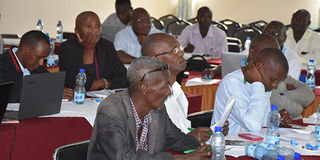Pastoral counties hail return of digital tracking of livestock

Participants during a public participation forum in Isiolo town on December 10, 2019 on the government's proposed livestock identification and traceability system. Leaders from pastoral counties have supported the proposal saying it will end rampant cattle rustling. PHOTO | WAWERU WAIRIMU | NATION MEDIA GROUP
What you need to know:
- The system seeks to replace the old way of using hot iron to brand animals.
- The devices will have electronic readers and gadgets for transmission of information.
- No animal will be moved from its place of birth before the application of an identification device.
Leaders from pastoralist counties have hailed the government’s plan to reintroduce a digital animal identification system to recover stolen livestock.
The electronic livestock identification and traceability system was initiated by the Directorate of Veterinary Services in 2011 and was expected to tame cattle rustling.
The State Department of Livestock, in the proposed regulations currently in the public participation stage, seeks to replace the old way of using hot iron to brand animals.
ELECTRONIC CHIPS
In the new method, electronic chips will be fitted on each animal’s left ear for identification, registration and tracking purposes.
The devices will have electronic readers and gadgets for transmission of information to a central database covering the entire country.
Among the information livestock owners will be required to provide is the animal’s date of birth and the location address, sex, breed or colour of coat, whether it has been imported and its health and movement records.
Led by Isiolo Woman Representative Rehema Jaldesa and Deputy Governor Issa Abdi, the leaders said the system will be a game changer for pastoral counties in curbing rampant cases of cattle rustling.
TAME UNSCRUPULOUS DEALERS
The leaders said the system will also address lack of an effective identification method for animals, which makes it easier for herders to frame their buyers and collude with police to recover the animals after they sell them.
“The regulations will help in curbing cattle rustling and dealing with cartels involved in the business including some members of the security team,” said Ms Jaldesa.
While supporting the schedule restricting animal movement from one establishment, holding or premises to another without a movement permit, the deputy governor said the system will aid the government in disease surveillance.
“It will be easy for the government to trace the origin of sick animals and take necessary action including quarantining the affected areas,” said Mr Issa.
Mandera West MP Adan Haji Yussuf, who is also chairman of Pastoralist Parliamentary Group (PPG) livestock sub-committee, said the new system will enhance tracing of the animals and its products from producer to consumer.
QUALITY HIDES
“The hot iron way has been damaging the hides and with the new system, we will now be able to sell high quality products and even trace them to their origin,” said Mr Yussuf while vowing to lobby Parliament to pass the Bill.
Under the regulations, no animal will be moved from its place of birth before the application of an identification device which should be done within the first month of birth.
Any person with an animal older than a month with no identification device faces a fine of Sh20,000 or six months in jail.
Should one lose the identification device, they must report to the police within 15 days for issuance of an abstract to be presented at the county director of veterinary services for replacement.
SCHEDULE
It will also be an offence for any herder to deface the identification device through either mutilation or cutting off the ears.
The leaders also backed a schedule requiring that owners of animals to notify the Director of Veterinary Services of the acquisition within 15 days after purchase of animals which must bear the original identification devices and codes.
They will be required to share information on where the animal is kept for update of records in the county register and the central database.
The system is also expected to boost livestock business as producers, processors and manufacturers of animal products will be required to ensure that the products are clearly labelled, incorporating corresponding animal identification numbers for product traceability.
RESTRICTIONS
Speaking during a public participation meeting in Isiolo town covering 19 counties, the Chairman of Kenya Veterinary Association Samuel Kahariri said it will be completely impossible for livestock owners to access government facilities such as abattoirs if their animals are not fitted with the gadgets.
“We want to get rid of cases of people feeding on meat, among other products, that could be unsafe. The gadget will help meat inspectors know the animal’s health history and decide on whether it should be slaughtered or not,” said Dr Kahariri.
With the central database linked to government and financial institutions, livestock owners will also access loan facilities and start income generating projects.





